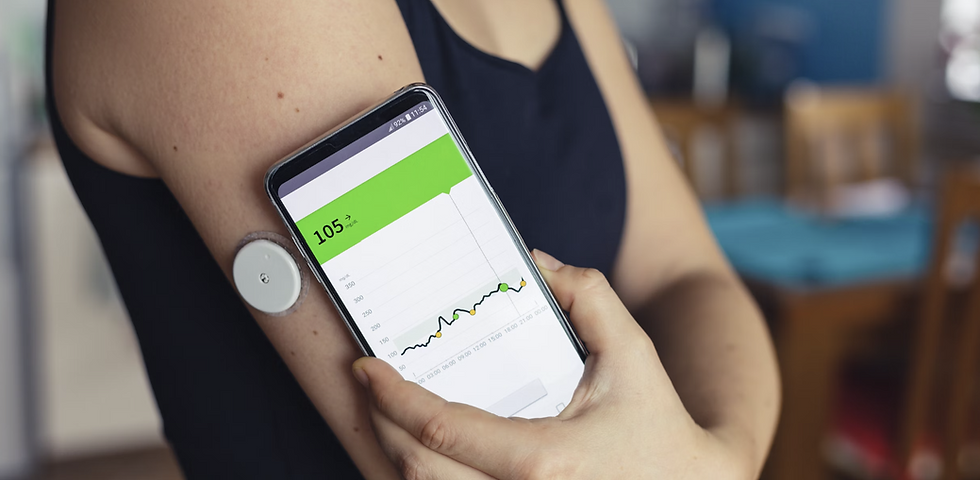Can Type 2 Diabetes Be Reversed or Only Managed?
- Elane Bosman

- Jul 24, 2025
- 3 min read

A Functional Medicine Perspective on Remission and True Healing
For decades, type 2 diabetes (T2D) has been viewed as a chronic, progressive disease that could be managed—but not reversed. Patients were often told they'd be on medication for life, with the goal of slowing down complications rather than restoring metabolic health.
However, in recent years, a wave of clinical evidence and patient experiences have reshaped this belief. Emerging research shows that remission—or even reversal—is possible for many people with T2D.
So what does "reversal" really mean? And how can we achieve it using integrative and functional medicine tools?
Let’s break it down.
What Is Type 2 Diabetes, Really?
Type 2 diabetes is a metabolic disorder characterized by:
Insulin resistance (cells don’t respond well to insulin),
High blood glucose levels, and
Eventually, impaired insulin secretion.
But T2D is not just a blood sugar issue — it’s a complex interplay of:
Diet and nutrient status
Stress, sleep, and hormones
Mitochondrial function
Inflammation
Liver and gut health
In functional medicine, we view T2D as a systems imbalance, not just a glucose regulation issue. This opens the door to true, root-cause healing.
What Does "Remission" or "Reversal" Actually Mean?
Medical Definitions:
Remission (American Diabetes Association, 2021):HbA1c <6.5% for at least 3 months without the use of glucose-lowering medications.
Partial Remission: Blood sugars remain in the prediabetic range without medications.
Complete Remission: Blood sugars return to normal ranges without medications for 1 year or longer.
Prolonged Remission: Normal glucose levels for 5+ years without medication.
Important Note: Remission ≠ Cure. The underlying susceptibility may still exist, but the disease process is no longer active.
What the Research Says
1. The DiRECT Trial (2018) – UK
A landmark randomized controlled trial showed that 46% of participants achieved diabetes remission at one year after following a low-calorie nutritional intervention (~850 kcal/day) for 3–5 months, followed by food reintroduction and lifestyle support.
Reference: Lean MEJ et al., Lancet, 2018;391(10120):541-551.
2. Virta Health Study (2021)
In a real-world ketogenic, low-carb nutritional program:
Over 60% of patients reduced or eliminated insulin within 10 weeks.
At 2 years, 53.5% maintained diabetes reversal with sustained HbA1c improvements.
Reference: Athinarayanan SJ et al., Front Endocrinol, 2019.
3. Look AHEAD Study (2013)
Demonstrated that intensive lifestyle interventions (diet, exercise, behavioral therapy) improved glucose control and reduced cardiovascular risk factors over time.
Reference: Look AHEAD Research Group, NEJM, 2013.
Functional Medicine View: How We Approach Reversal
Unlike conventional models focused primarily on glucose-lowering medications, functional medicine addresses why insulin resistance is happening in the first place.
Key Strategies:
Nutritional Rebalancing
Low-glycemic, anti-inflammatory diets
Reversal of nutrient deficiencies
Reversing Insulin Resistance
Fasting protocols (under supervision of your HCP)
Targeted supplements
Liver and Mitochondrial Support
Improve fatty liver through detox pathways
Micronutrient support
Stress and Cortisol Balance
Cortisol management through Integrative tools
Movement is medicine
Microbiome Modulation
SCFA-producing bacteria management
Clinical Indicators of Reversal
Lab Marker | Target Range for Reversal |
Fasting Glucose | 70–85 mg/dL |
HbA1c | <5.7% (ideally <5.4%) |
Fasting Insulin | 2–6 μU/mL |
HOMA-IR | <1.5 |
Triglycerides | <100 mg/dL |
Waist-to-Height | <0.5 |
Is Reversal Right for Everyone?
Reversal is most likely in early to moderate-stage diabetes, especially within 3–6 years of diagnosis. However, many patients with long-standing diabetes can:
Reduce medication load,
Improve energy, and
Stabilize blood sugar even if full reversal isn't achieved.
Reversal is not about perfection, but about restoring the body's metabolic flexibility.
A Collaborative, Empowered Approach
If you’re a patient, here’s what you can do:
Discuss remission openly with your provider.
Track your progress with labs and symptoms.
Build a team that supports lifestyle medicine: nutritionist, health coach, functional practitioner.
"Reversal is not a miracle — it’s a metabolic reset supported by consistent action."
Final Thoughts
Yes — Type 2 diabetes can be reversed in many cases. But it takes more than just cutting sugar or taking medication. It requires:
Addressing the root causes,
Rebalancing multiple systems, and
Reclaiming responsibility over your daily choices.
Whether you call it reversal, remission, or recovery, the goal is the same: restoring your body’s ability to regulate itself naturally.
And that’s not just possible — it’s already happening all over the world.




Comments